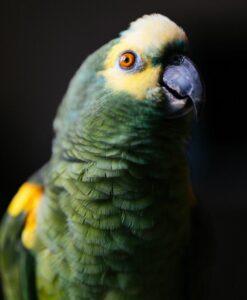Amazon Parrots For Sale
Amazon parrots typically play hard. An Amazon parrot might swing upside down from the cage, delight in destroying their wooden toys and even wrestle their owner’s hand with their beak.
An Amazon parrot’s mood is one of the easiest to read among parrot species because it is excellent at expressing itself through its body language: pinning eyes, raised head/neck feathers, fanned tail feathers and broad stance, for example, indicates a highly excitable Amazon parrot.
An Amazon owner should pay close attention to his or her Amazon parrot’s body language to be fully attuned to the bird’s mood. An excitable Amazon parrot might be telling you that it doesn’t wish to be handled, and failure to recognize this might result in a bite.
An Amazon parrot can also go into “play overload” during play, especially when beak wrestling with you. Stop the play session to give your Amazon parrot time to calm down as soon as you see overly excited body language. Male Amazon parrots, especially male double-yellow-headed Amazons, yellow-naped Amazons and Blue-fronted Amazons are said to be more aggressive than females of their species.
Speech & Sound Of Amazon Parrots
Amazon parrots are one of the better talkers of the parrot world. They seem to be especially fond of music and singing. An Amazon could careless if the song it sings is off-key; it will sing as if it wrote the sing itself. Amazons can learn to speak a many words and phrases and imitate sounds. An Amazon parrot can also be noisy, especially when it wants attention. It can scream loudly and some make a repetitive honk-like sound when they want something. Some Amazons make a little shrill sound to express delight while they eat a favorite treat.
Health & Common Conditions
Amazon parrots are prone to becoming obese, which is why owners should pay attention to the amount and types of food offered daily. Other diseases/conditions that affect Amazon parrots include: Polyomavirus (can cause anorexia, lethargy, weight loss, death); Chlamydiosis (signs include low appetite, fluffed feathers, nasal discharge) and vitamin-A deficiency if fed an inadequate diet.
Get an Amazon Parrot
Amazon parrots are typically available in avian-specialty stores and from bird breeders. They are also frequently available for adoption from an avian rescue organization. If you are adopting an Amazon parrot, be sure to ask why the bird was given up for adoption and if it has any behavioral issues.
African Grey Parrot for Sale
African greys have been pets for thousands of years—there are records of these birds as household pets in biblical times. It has a fascinating ability to reason and an uncanny talent for accurately mimicking words and phrases. It can also understand human speech, which has helped to catapult this bird to stardom in research circles and the pet trade.
These African grey parrot for sale are one of the most talented talking/ mimicking birds on the planet, giving it quite a reputation among bird enthusiasts. Not only do bird keepers love this intelligent bird, it’s one of the most recognizable species to bird novices as well everyone knows the African grey parrot. Understated beauty and a brainy no-nonsense attitude are what keep this parrot at the peak of popularity.
Diet and Nutrition
The best food for an African grey parrot in captivity is a high-quality, formulated pellet supplemented with fruits such as pomegranate, organic mango, and melon. Also, provide fresh vegetables, including leafy greens like arugula, watercress, kale, sprouts, and healthy seeds such as hemp and flaxseed. You can pre-make chop, a salad for birds, that will help keep your African grey parrot healthy and thriving.
Many African greys also enjoy a variety of treats and snacks, such as nuts and healthy table foods like steamed green beans, breakfast toast, and salad. Offer you bird a half cup of pellet-based parrot mix and a 1/4 cup of fruits and vegetables daily and adjust the quantity according to their appetite. Remove and discard all uneaten fresh food by the end of each day.
Caring for an African Grey Parrot
The African grey parrot bird is a medium to large-sized parrot that needs adequate living space. Minimum cage size should have a 2-foot by 2-foot footprint and 3 feet in height. Larger cages are preferable.
Without plenty of interaction and training, an African grey parrot may become depressed and exhibit self-mutilating behaviors, such as feather-plucking.
These birds thrive when they have lots of opportunities for playing with toys, interacting with their owners, and learning words and tricks. Expect to spend several hours each day interacting with and training your African grey parrot for sale, many owners report that African grey parrot enjoys having television or radio playing when it is left alone.
These bird are said to be somewhat sensitive and easily affected by stress and commotion, they are more relaxed if the cage is placed in a quiet corner of the room rather than in the center.


